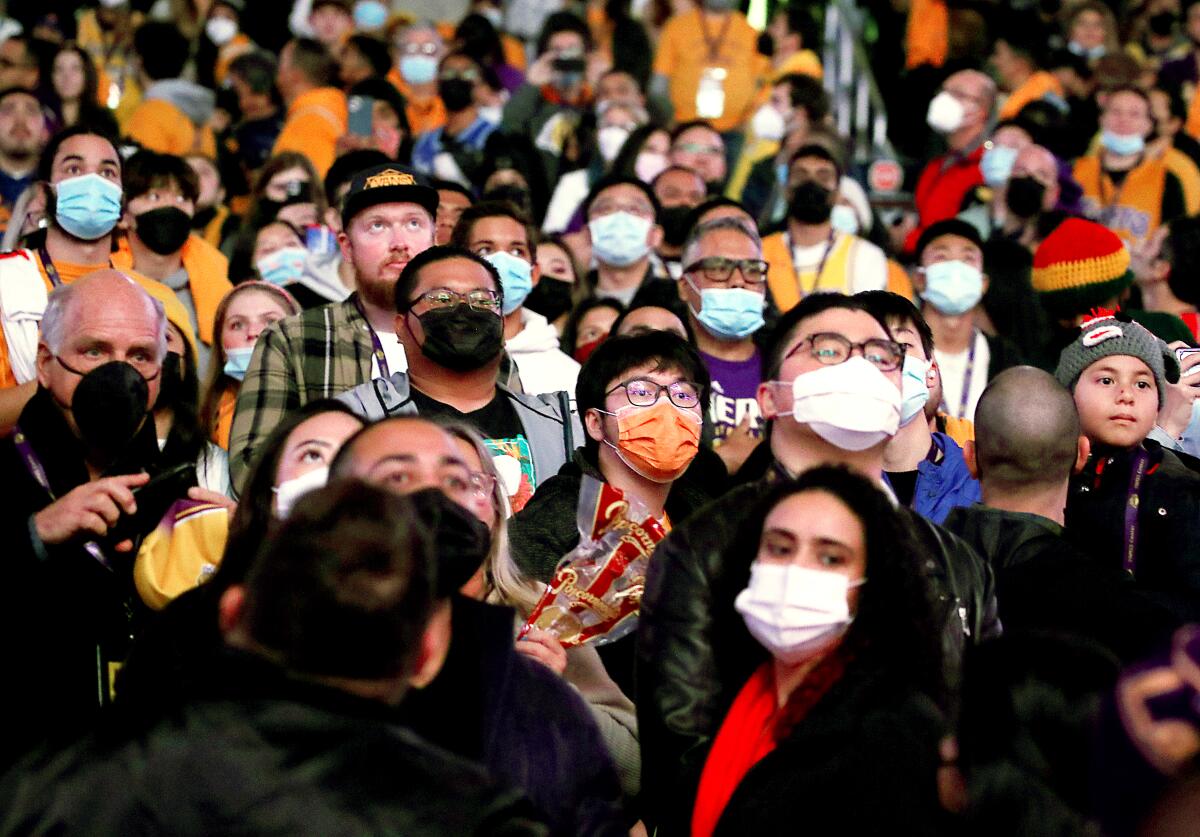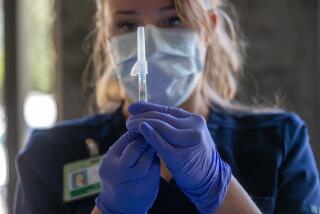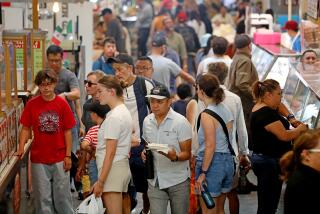Op-Ed: Yes, please, bring back the mask mandate

- Share via
It’s the summer of the subvariants. The summer you or at least someone you know got COVID. The summer masks were off all over town, but not for much longer.
I’m a doctor and I know better than most that there is bad news — and good news — about the never-ending pandemic.
COVID-19 cases in California, and especially in Los Angeles, are increasing, but if you get infected with BA.5, you likely won’t get as sick as you would have from an earlier Omicron iteration, and definitely not as sick as from the original virus or the nearly forgotten Delta variant.
Nonetheless, hospitalizations of coronavirus-positive patients are rising far enough and fast enough —10.5 per 100,000 as of this week, with death rates that have roughly doubled over the last month — to move L.A. County from the moderate to high level of community transmission. It’s a good bet that the Department of Public Health will reinstate a mask mandate for indoor public spaces at the end of July.
Not everyone agrees with the need to go back to a mandate. As the virus has changed, with the subtlest switch of a molecule leading to drastically varying infectious behavior, we humans have remained steadfast in two notable points of contention: vaccines and masks.
At least in Los Angeles, nearly 74% of us are fully vaccinated, and all individuals ages 6 months and older are eligible. Vaccines were initially shown to wholly protect us from getting infected. Now they seem to be acting as one layer of protection in a time where many layers are needed. The number of people sick with COVID is still relatively low compared with last summer or this past winter, and along with treatments and the changing nature of virus itself, vaccination is what’s helping keep COVID symptoms comparatively mild. Reupping a mask mandate can help hold those lines, even if only marginally.
It was just two months ago, in May, that most Los Angeles schools made indoor masking optional. I asked my school-age patients what they were going to do. Some told me it was just easier to leave their masks on. They felt safer. Most, however, ditched their masks. And just like clockwork, I saw new cases of COVID ticking up among students, teachers and many of my youngest patients, just in time for school plays, proms and graduations.
For me, wearing a mask is a given. I treat young and oftentimes critically ill infants, children and young people, and I haven’t spent a day at work without a mask in place since March 2020. At a healthcare facility, the lion’s share of employees as well as patients couldn’t fathom the notion of ditching the masks for more than a few minutes at a time. Mask wearing has stabilized unstable times for me; it’s a pillar of my new normal.
Outside the office, my rules are a little looser, but not by much. I wear a mask in stores, mandate or not. I eat only at outdoor restaurants, and even when gathering with family or friends, we do so outdoors.
When the school mask mandate was lifted, in the few days of innocence when I thought my thrice-vaccinated teenagers were fully bubble wrapped against spike proteins, my husband and I (we’re both surgeons) left it up to them regarding masks on or off during indoor activities. We adults, however, kept ours on.
Wearing a mask indoors just seems so easy. Is it a foolproof protector? Hardly. But it does help the wearer as well as those around them shut out infection. And it’s a sign of respect to others. I’ll always remember the parent of a young patient of mine reminding their child to keep her mask on to “protect the doctors and nurses.” It’s really that simple.
Just last week, a friend commented to me that I must be happy that the mask mandate would be coming back. Yes and yes. I obsessively check the daily data on cases, hospitalizations, deaths and positivity, and I expect those figures to improve if more people are masked more of the time.
The more we can do to stave off an increase in infections that could overwhelm hospitals, the healthier we all will be. In the early days of the pandemic, and even during recent surges, COVID hospitalizations meant that non-emergency surgeries and non-urgent medical tests and exams were put on hold, and people got sicker. Not just from COVID, but also from everything else. Masking is not forever. And it is just one more way to help dig us out of this.
Another friend, a fellow physician who had dodged COVID until just last week, taught me a new, somewhat tongue-in-cheek term for a person who’s never been infected: “COVID virgin.” Which I remain. At least for now.
Will wearing a mask enable me to preserve my COVID virginity? It may or it may not. But if you’re wearing one too, the odds will be better for both of us.
Nina Shapiro is director of pediatric ear, nose and throat at UCLA Mattel Children’s Hospital and author of “The Ultimate Kids’ Guide to Being Super Healthy.”
More to Read
A cure for the common opinion
Get thought-provoking perspectives with our weekly newsletter.
You may occasionally receive promotional content from the Los Angeles Times.










